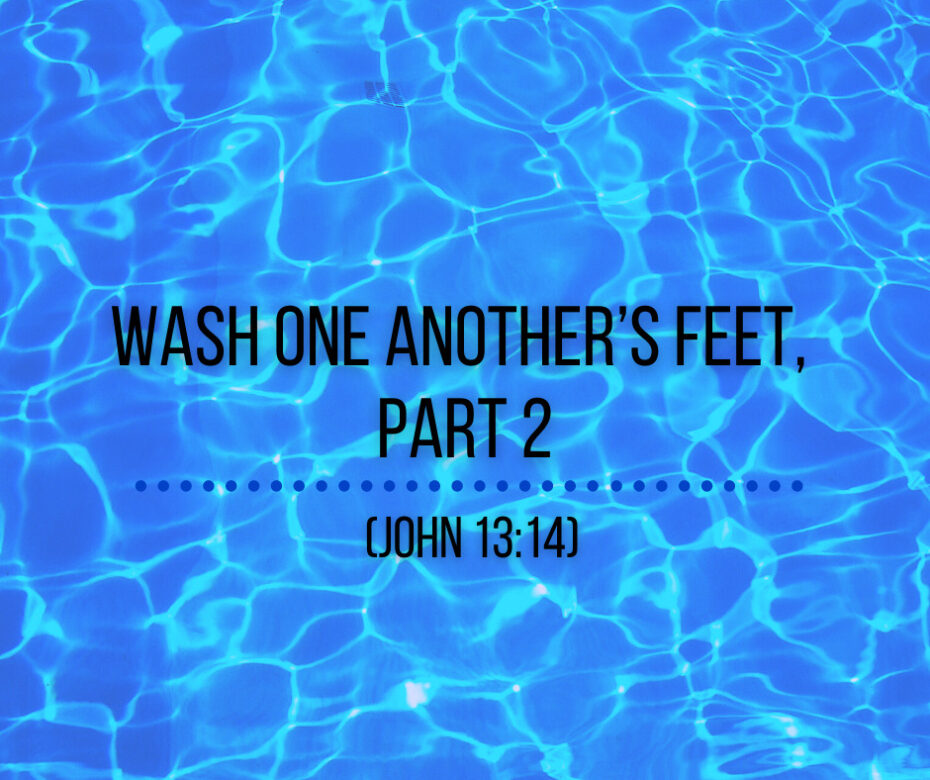The New Testament has about 58 “one another” commands that describe what a normal Christian church life can be.
It’s the kind of community I want to—need to!—experience.
But what does that church life look like?
The second example of these commands is to wash one another’s feet (John 13:14). In the previous post, we saw that this command means normal church life is neither anonymous nor impersonal but filled with humble acts of service. If the Lord of lords stooped to wash a fisherman’s stinky feet, then so can you.
However, John’s Gospel is well known for having double meanings, and Jesus said several things to Peter to make you realize that His actions held a deeper lesson.
For example, Jesus said,
“What I am doing you do not understand now, but you will know after this” (John 13:7).
What more was there to understand? Visitors were expected to wash their feet before entering a home. It was common courtesy. However, Jesus indicated there was more going on than they realized. That was the first hint.
The second hint came when Jesus said,
“If I do not wash you, you have no part with Me” (John 13:8b).
Jesus was not saying Peter’s relationship to Him depended on his personal hygiene, so washing must be a picture of a deeper truth. But what?
“He who is bathed needs only to wash his feet, but is completely clean; and you are clean, but not all of you” (John 13:10).
Jesus had two kinds of washing in mind: a full body wash plus washing your feet. Elsewhere, Paul wrote about “the washing of regeneration and renewing of the Holy Spirit” (Titus 3:5), and that seems to be what Jesus means here. To be bathed is to be regenerated. That only happens once and has a permanent effect, which seems to be what Jesus is saying. As Tony Evans explains, “In other words, if you’re already saved, you don’t need to be saved again” (The Tony Evans Commentary, p. 1047). Likewise, Charles Welch says, “this washing, having once been accomplished, remains effective and unaltered by the passing of time” (Welch, Life Through His Name, 379).
Once bathed, always bathed!
However, according to Jesus, bathed people still need to wash their feet. What does that mean?
What Jesus taught through symbolic action, John later put in doctrinal form:
But if we walk in the light as He is in the light, we have fellowship with one another, and the blood of Jesus Christ His Son cleanses us from all sin. If we say that we have no sin, we deceive ourselves, and the truth is not in us. If we confess our sins, He is faithful and just to forgive us our sins and to cleanse us from all unrighteousness (1 John 1:7-9).
Jesus used washing feet as an illustration of forgiveness. Did you know that even born again people continue to sin in thought, word, and deed? In God’s eyes you’re still bathed, but your feet get dirty and need a spiritual foot washing. So Jesus washes your feet when you confess your sins.
But Jesus is not the only one to wash feet. He commanded the disciples to do it, too. We have to wash one another’s feet.
Fellowship forgiveness points in two directions—vertical (with God) and horizontal (with one another). You need God to forgive you, but you also need to forgive other people (cf. Eph 4:32; Jas 5:16; Luke 17:4).
When you live a thick church life, you’ll step on each other’s toes, so be ready to wash one another’s feet.


